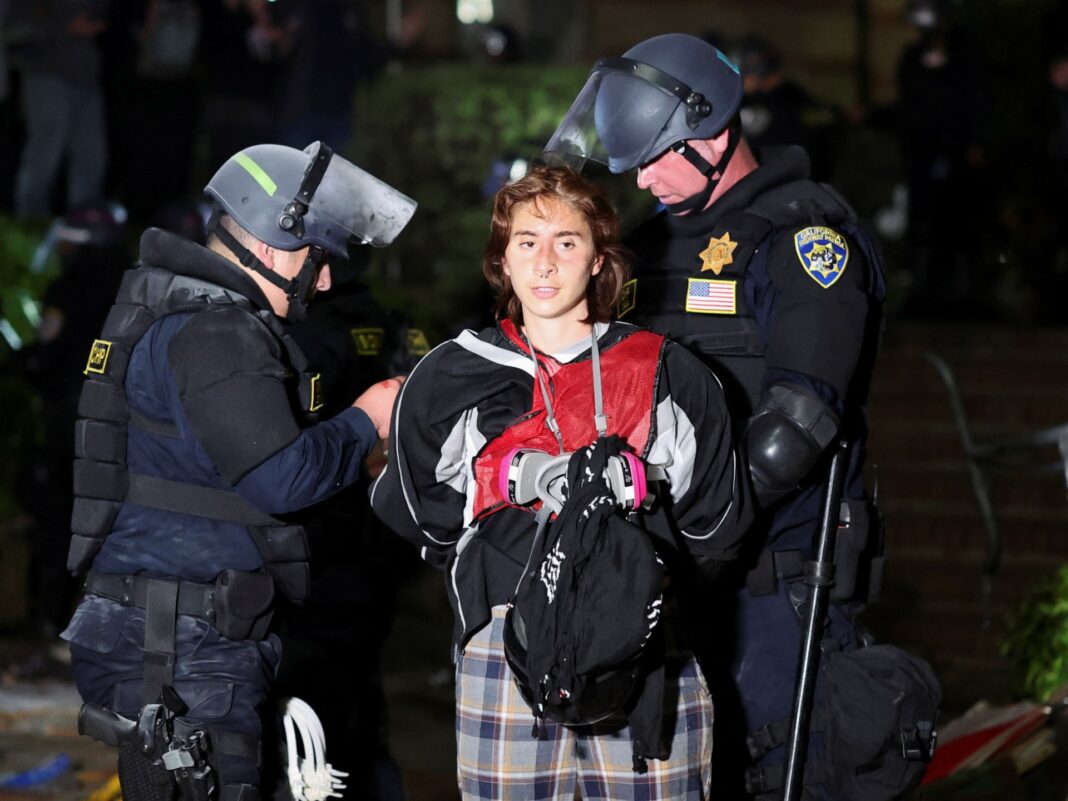“Fat”, “ugly”, and “bitch” are just a few of the invectives hurled at female antiwar protesters by “counter-protesters”, a name the press has given to pro-Israel demonstrators, angry mobs, and frat boys gathered to jeer and perform monkey dances alike. Counter-protesters routinely shout that they hope female protesters voicing support for Palestinians in Gaza are raped. Pundits condescend that the antiwar protesters are coddled, silly, ahistorical, and misguided.
Female professors, like the former chair of Dartmouth’s Jewish studies department, Annelise Orleck, and Emory’s philosophy chair Noelle McAfee and economics professor Caroline Fohlin, have attempted to intervene in male officers’ “duty” to violently clear pro-Palestine student encampments only to be met with humiliation and brutality. “Get on the ground,” an enraged male police officer screamed breathlessly at Frohlin. When she did not take her place immediately at his feet, officers forced her there, smashing her head on the concrete. The taunts of the pumped-up bro attacking the UCLA encampment summed it up, “You stand no chance old lady.”
This is more than good old-fashioned sexism rearing in the heat of the moment. The female antiwar protesters have broken the unwritten rules of being a woman in the United States. They are neither on display for men nor acting like men. Hypermasculine antifa tactics are at a minimum, if not absent. The peaceful – even “culturally feminist” – encampments feature meditation, lectures, song and dance, and yoga.
These performances are not for the male gaze. Female students are swaddled in masks and keffiyehs and using social media for political messages, not painted in makeup and using Kardashian-filtered visages to amass likes. Why would any woman choose the former over the latter? Megyn Kelly has the answer. They are “homely”, she declares, adding that “attractive” women would not protest.
One viral video shows the Los Angeles police, after their night-time invasion of the UCLA encampment, stripping a handcuffed young Asian woman of her head coverings and facing her into the glare of news camera lights, almost reminiscent of the public stripping of heretical women in the dark ages. The LA police’s grotesque display of arrestees is nothing compared with the NYPD’s propaganda videos after its military-style raid of Columbia’s Hamilton Hall to arrest a handful of students within.
These women are not there to please the media either. They are wary of mainstream reporters who have portrayed them as pro-Hamas terrorists. They know to avoid opportunists who seek viral soundbites to prove protesters are silly and stupid or deadly serious and dangerous. They are tight-lipped and letting their presence, and copious posters, do the speaking.
One social media “influencer” sought clicks by “checking out” the UCLA encampment. Striding up, blond hair flowing behind, she said she wanted to just “speak to them”. After being referred to media liaisons, who said they “didn’t want to talk to someone who is going to push us”, she went back to a group of women, still demanding an impromptu interrogation. When they regarded her in silence, she called them “intimidating” and began to cry. The prototype of the crying, fearful woman has a long pedigree in this country, and the anti-protest camp’s publicity frequently features young, frightened women who feel “unsafe”.
Exemplifying the utter discomfort at female protesters’ unwillingness to play the role of people-pleaser is Wall Street Journal reporter Peggy Noonan’s hit piece on the Columbia demonstrators. At best, she says, these kids are clueless: “Critical thinking isn’t your strong suit, emotion is.” When have women heard that before? But, Noonan argues, something more nefarious is going on, as evidenced by the protesters hiding their faces, doxing risk notwithstanding, and not talking to her. “Friends, please come say hello and tell me what you think,” Noonan called to a group of women. Only the “beautiful girl” made eye contact and laughed at a quip Noonan made, but her grim “friends gave her a look and she conformed”.
Anti-protesters fault female demonstrators for being on the side of Palestinians, whose culture they say does not permit women to do things like protest. The apogee of this argument was a celebrity calling LGBTQ protesters “idiots” because Hamas would decapitate them and play with their heads “like a soccer ball”. Such characterisations of Gazan society are Islamophobic and overexaggerate sexism, but regardless, calling to end the slaughter of a civilian population does not make one a proponent of that population’s social mores. There is indeed a sublime hubris to invoking the argument that Hamas does not let women speak in one’s effort to shut female protesters up.
Our reaction to the students who are protesting against what they see as genocide in real time is eye-opening. From celebrations of militarised and gratuitously demeaning policing to tolerance of extreme misogyny as long as it is directed against the right women, this moment speaks volumes about who we are.
The views expressed in this article are the author’s own and do not necessarily reflect Al Jazeera’s editorial stance.







